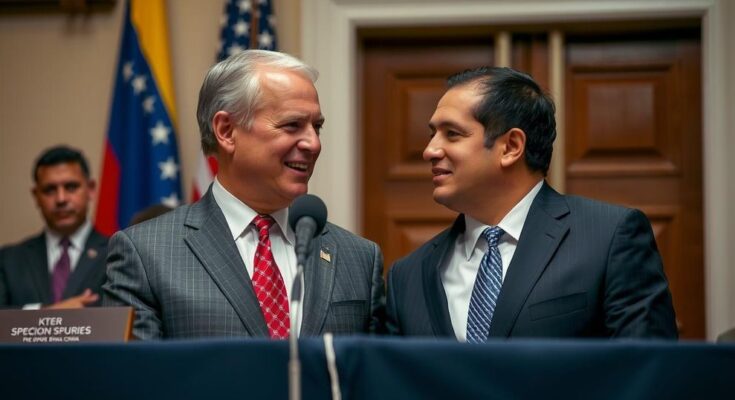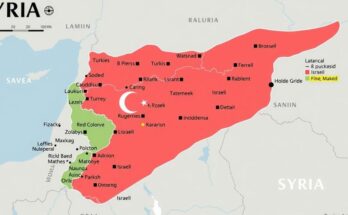President Joe Biden will meet Venezuelan opposition leader Edmundo González at the White House, following the recognition of González as “president-elect” after disputed elections. Conflict between Maduro and González escalates amid protests demanding election transparency. Current U.S. sanctions target Maduro’s allies, reflecting international concern over Venezuelan governance. The meeting may bolster González’s efforts to challenge Maduro and promote democratic reforms.
President Joe Biden is set to meet with Edmundo González, a prominent Venezuelan opposition leader, at the White House on Monday. This scheduled meeting follows the Biden administration’s recent recognition of González as the “president-elect” of Venezuela due to the nation’s controversial elections held in July. González asserts that he won decisively against President Nicolás Maduro, a claim the Maduro regime vehemently disputes, accusing González of manipulating vote totals.
The backdrop to this meeting involves widespread protests in Venezuela, where citizens are demanding the release of official election results in light of the perceived irregularities during the electoral process. González has launched an international campaign to gather support against Maduro, making stops in Argentina and Uruguay, as well as rallying Venezuelan expatriates in Washington to advocate for democratic reforms.
Despite claims of victory, Maduro’s government has largely resisted acknowledging the disputed nature of the election results and has planned to formally elevate Maduro to a third presidential term this coming Friday. The controversy largely stems from insufficient transparency during the vote count, with Gonzalez’s team reporting that he secured double the votes of Maduro based on data from electronic voting machines positioned across the country.
In conjunction with these political maneuvers, the Biden administration has expanded its sanctions against Maduro’s allies, with notable measures imposed against key officials. The U.S. Treasury Department recently announced sanctions targeting 21 individuals due to allegations of ongoing repression against Venezuelan citizens following the contentious election results. Critics, however, question the effectiveness of such sanctions, as significant figures in the Maduro administration continue to hold power.
Acting Under Secretary of the Treasury for Terrorism and Financial Intelligence, Bradley T. Smith, remarked that the repressive actions of Maduro were a “desperate attempt to silence the voices of its citizens.” U.S. Secretary of State Antony Blinken has also expressed serious concerns, stating that it is critical that “every vote be counted fairly and transparently” with the electoral authorities being held accountable to the public.
This forthcoming meeting between President Biden and Edmundo González is poised to be crucial in strengthening González’s international presence and exerting pressure on Maduro’s government, although the precise agenda remains uncertain.
This report includes information from The Associated Press.
The article discusses the political landscape in Venezuela following disputed elections that have led to a crisis of legitimacy for President Nicolás Maduro. Tensions have escalated as the Biden administration recognizes Edmundo González, the opposition leader, as the legitimate president-elect, instead of Maduro. The political climate is characterized by protests, calls for transparency in elections, and international scrutiny of the Venezuelan electoral processes. The implications of U.S. sanctions against Maduro’s officials and the potential impact of Biden and González’s meeting on future relations are also highlighted.
In summary, President Biden’s meeting with Edmundo González signifies a critical juncture in Venezuela’s ongoing political conflict. With the Biden administration’s recognition of Gonzalez as president-elect, combined with highlighted sanctions against Maduro’s officials, the U.S. seeks to amplify support for democratic governance in Venezuela. The responses from both the Venezuelan government and the international community will be crucial in shaping the future political dynamics in the region.
Original Source: www.newsweek.com




